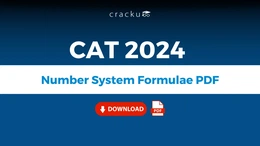The Common Admission Test, or CAT, is one of the tougher tests that any student in India has to take for MBA admission to institutes like the Indian Institutes of Management. With over lakhs of students aspiring for limited seats available in institutes, small habits do count.
One such vital aspect that contributes toward the success of a candidate is that of rough work during the CAT exam.
In this article, we shall discuss the importance of rough work for CAT, suggestions on how to manage one's rough work efficiently, ways of doing best rough work, common mistakes that candidates make while doing rough work, tips on optimizing the rough work for faster calculations, and ensuring that one uses up all the available rough sheets in an efficient way during the exam.
The CAT test is known for speed and accuracy. Be it the QA, DILR, or VARC questions, the candidates quite often require writing down numbers or steps or even creating quick diagrams.
Why rough work is important:
Here's why rough work is so important:
- Avoid Mental Fatigue: All calculations in the head would result in having to think very hard, thus leading to their own error chances. You thereby offload the mental effort and get better accuracy by carrying out rough work.
- Clarity of Thought: Writing down your steps structures your problem-solving approach. It allows you to go back and check your work in case you need to verify any steps.
- Speed and Efficiency: In the absence of good rough work, you end up hasty in solving questions and lose track of the intermediate working.
In the absence of proper appreciation for rough work, confusion, mistake, or inefficiency happens in problem solving that may well cost precious time and marks.
Rough Work Booklet in CAT Exam
In the CAT exam, you are not allowed to carry a lot of things, including your own pen and paper. Both of these things are given to you by the examination conducting body and taken back by the end of the exam.
The problem that most students face in the exam is that the work they have been doing is done primarily on an A4 sheet of paper with a pen of their choice. All of this changes in the examination. Suddenly, you are handed a thin paper booklet with 12 pages comprising 24 sides.
You try to deal with it by writing small and creating smaller tables but your brain simply cannot get it a flow state and do the problems as you used to. To fix this, we have a solution. You can now buy booklets for practice - these booklets are the same as those provided in the CAT exam.
A lot of thought process was given to this to make sure that students, while giving the CAT exam are in a very familiar environment. To purchase these booklets, click on the link here.
We further advise the students to give all their mocks on these booklets using a ball pen. These small things lead to an increase in a familiarity which will help you immensely during the CAT exam. Taking care of these intangibles is essential.
Where to Buy CAT Exam Rough Booklet for Practice?
Yes! Cracku has introduced these notepads to you, which are same as those given during the CAT. It is highly advisable that students use these booklets to practice. This will reduce the degree of unfamiliarity when you sit in the examination hall. Further, you will get used to smaller digits and lesser calculation thereby, increasing your speed of solving.
Prepare effectively for the CAT exam with our specially designed rough booklet. This booklet provides ample space for solving complex problems and practicing mock tests, making it an essential tool for every CAT aspirant. Each booklet is similar to the actual rough booklet you will get in CAT exam with 24 A5 pages. Boost your CAT exam preparation with this must-have resource and stay on top of your game. This bundle contains 15 booklets (360 pages)
How to Handle Rough Work in CAT Exam
Effective management of your rough work is necessary when sitting in a time-pressured environment like CAT. Again, given the scarcity of pages in provided to write your rough sheets during the test, and every minute in the game now, this becomes strategic.
Here's how you can manage your rough work:
- Organize the Space: Use your rough sheet in a systematic and organized manner. Allocate some sections of the sheet to different questions or sections of the exam.
- Be Brief : Do not write full sentences or too much detail about the steps. You only need to follow what is being done, write it. Example: Like in a quadratic equation, the key elements of the equation should be written and symbols or short forms should be used to save time in the case of DILR.
- Number the Questions: One of the most efficient ways of handling any rough work is to put question numbers at the top of the left hand corner of the rough sheet as you go along. That way, if you need to refer to the rough work related to a certain question, you can immediately be taken back there for closer examination or verification of the solution.
- Avoid Overcrowding: As much as you want to make fullest utilization of a single sheet of rough paper, overcrowding can confuse you. Give yourself ample space so that you do not end up confusing the results of each problem.
Best Practices for Doing Rough Work in CAT Exam
Applying best practices while doing rough work can get you improved speed and accuracy. Here are some proven techniques:
- Use Diagrams and Tables: For Data Interpretation and Logical Reasoning, your friends are diagrams and tables. Sometimes the data contains patterns and solutions more visibly than if you had to calculate every detail in your mind.
- Break Down Complex Problems: If a problem is too complicated, break it down into smaller parts that can easily be solved. Weigh out intermediate steps in rough work to make calculations simpler.
- Consistent Notation: Keep your notation consistent on the exam. If you do use any symbols for addition, multiplication, or fractions, use them consistently on your scrap sheet so it is easy to spot inconsistencies. Incase of DILR, be clear about the letters that help you with representation.
- Work in Columns: Use columns of your scrap sheet to divide up different parts of your work so it doesn't spread out and thus isn't as difficult to review if you need to.
- Use Estimation: The QA section can also be handled using estimation. For example, when you are multiplying large numbers, round them off a bit in your rough work for saving time. You should, however know when to switch back to exact numbers.
Common Mistakes in Rough Work CAT Exam
While rough work is all good, most of the candidates commit blunders that end up costing them the exam. Some of the common errors and the ways to avoid them are listed below.
- Unorganized Scrawling: Out of brainstorming, unsorted mess can emerge. Given the time constraint, it becomes hard to know which step falls where for which problem. Keep it clean and organised. Question numbers on the left side, calculations towards the right.
- Wasting Time by Detailing Too Much: Some students get too much into the minute details in their rough work and write down every tiny step. This wastes a lot of time and should not be done. Your rough sheet is irrelevant the moment your exam ends.
- Skipping Rough Work Altogether: Complete skipping of rough work for easier questions makes a candidate loose. Silly mistakes are done to be ignored that could have easily been avoided with a quick jot-down. Under exam pressure, even 3*2 can be written as 5. You have a rough sheet and calculator for a reason, use it.
Optimization of Rough Work for Quick Calculation in CAT
In CAT, efficiency is the name of the game, and little more rough work can actually add up to get those all crucial seconds to answer more questions. So here's how you could optimize it
- Perfect Mental Short Cuts: Learn mental maths tricks. You see, as long as some multiplication through 5 or 11 goes, there is minimal rough work required, which is really good in QA as well. Learn tables, squares and reciprocals. It has worked in the past years with CAT but whether it will for the future is unknown. After the 2023 QA section, it is believed that CAT has turned more conceptual and even less calculation based.
- Practice Rough Work During Preparation: The CAT prep stages get themselves started with the fact that you practice rough work during mock exams as part of the preparation. It lets you get accustomed to the structure and time required.
- Use Pattern Recognition: Even while computing the value for each data point, look for patterns or groupings which will help you do your calculations more easily in rough work
Rough work is not just a tool used in doing computations for the CAT exam; it is an essential strategy that will make all the difference in achieving a very high score. It is very important to know, thus keeping properly with rough work, in accordance with best practice, avoiding mistakes and optimizing your process of completing the paper can really make a great improvement in your performance during an exam.


















